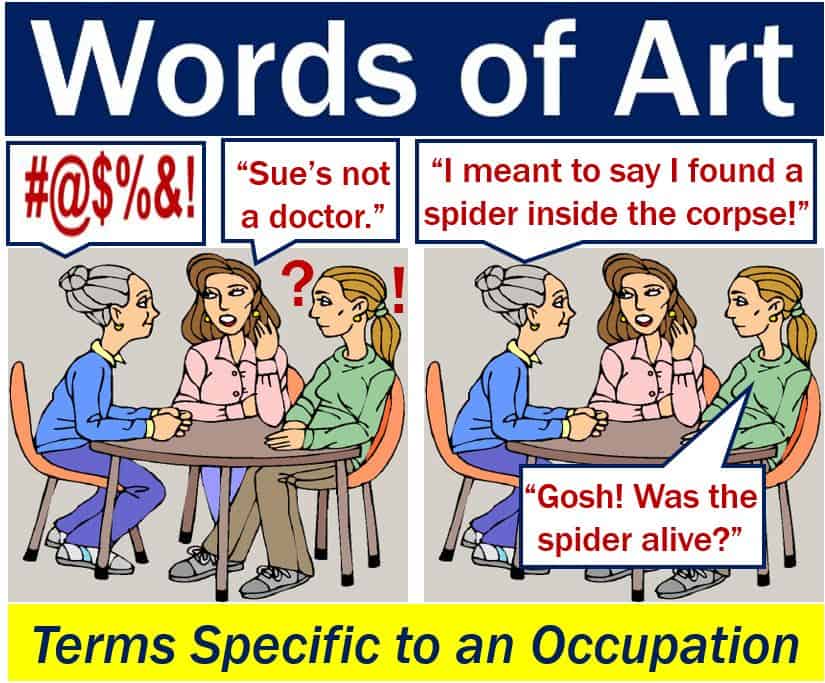Words of art – definition and meaning
Words of art, also called terms of art, are words that have a specific meaning in certain professions, activities, sports, or subjects which may be different in layman’s English. Even though native English-speaking societies share a common language, there are a large number of specialized uses of words based on specific activities or professions. Each profession has a number of expressions and terms that are peculiar or idiomatic to it.
For an individual who works within a profession, those terms and expressions become words of art, which typically convey a different meaning from their lay usage, or which an outsider may not understand at all.
Put simply, words of art refers to terms that only people who specialize in a particular occupation or subject use and fully understand.
Words of art – legal profession
Often a court trial involves information and terms that are difficult or impossible for lay people to understand. So, expert witnesses are called to give evidence – to testify.
An expert witness is familiar with the words of art for a particular profession or subject. An accountant, for example, who is called to testify on a corporate fraud case, will be familiar with all the words of art used in accounting and company finance.
 Slang is not the same as words of art. Slang is the use of informal words and terms that are not considered standard in the speaker’s language, while words of art are terms used with a specific meaning within a certain profession, group, subject, or activity.
Slang is not the same as words of art. Slang is the use of informal words and terms that are not considered standard in the speaker’s language, while words of art are terms used with a specific meaning within a certain profession, group, subject, or activity.
The expert witness typically explains the meanings of the relevant words of art to the jury, lawyers, and the judge.
Legal-Dictionary.TheFreeDictionary.com makes the following comment regarding specialized terms in legal situations:
“Because the law is based on the expression of language, it contains thousands of words of art. Many persons working outside the legal profession would recognize that ‘taking the Fifth’ means that a person is asserting his or her protection against self-incrimination under the Fifth Amendment to the U.S. Constitution.”
“However, very few persons would understand that an appellant is the party bringing an appeal, while a respondent is the party against whom the appeal is taken. Appellant and respondent are words of art.”
Examples of words of art
– Architecture: an apron is a raised panel below a tablet, wall monument, or window. Boss is roughly cut stone set in place for carving later.
– Ballet: attitude is a position in which the ballet dancer stands on one leg while the other one is raised and turned out with the knee bent.
– Business: deliverable means anything that needs to be done or completed by a certain date and verified by somebody else (another party).
 There are several movements in the UK, USA, Canada, Australia, Ireland, New Zealand, and other nations to get government departments and politicians to write and talk in plain English, without any words of art, jargon or gobbledygook.
There are several movements in the UK, USA, Canada, Australia, Ireland, New Zealand, and other nations to get government departments and politicians to write and talk in plain English, without any words of art, jargon or gobbledygook.
– Computing: a bus is a subsystem that transfers information from one computer component to another between computers or inside a computer. An instruction is a group of bits in a computer program that contains an operation code and typically at least one memory address.
– Economics: economists use the term money much more specifically than lay people. It means very liquid assets which are held at any moment in time.
– Elegant: elegant or beautiful are aesthetic terms that refer to the ability of an idea to provide insight into mathematics.
– Medical Profession: blue pipes means veins, cabbage means a heart bypass, and champagne tap means a flawless lumbar puncture.
– Music: agile means swiftly. In jazz, bend means sliding down half a step to the original pitch, or conversely sliding up half a step from the original note – it is a technique for establishing a pitch.
– Nautical: all night in means having no night watches.
– Poker: an action card is a card that causes considerable betting action because it helps at least two players when it appears on the table.
– Wine Tasting: baked refers to a wine with a high alcohol content that gives the perception of baked or stewed flavors. It may indicate that the grapes from which the wine was made were left exposed to the heat of the sun after they were harvested.
Are words of art jargon?
“Words of art” and “jargon” are similar in that they both refer to specialized terminology used within a particular field or context. However, they have nuanced differences and are used in distinct ways:
Words of Art: This term is primarily used in legal contexts and refers to words and phrases that have a specific, well-established meaning within the legal profession. They are terms that might have an everyday meaning but take on a precise, specialized significance when used in legal documents or discussions.
- Example: “Tort” in everyday language might be unfamiliar or misunderstood, but in the legal world, it’s a well-known term referring to a civil wrongdoing that causes harm or injury, leading to legal liability.
Jargon: This is a broader term that encompasses specialized language used by professionals in various fields, not just law. Jargon terms are specific to certain professions, industries, or hobbies and are used to convey ideas with precision among people within that field.
- Example: In the world of computer programming, “API” stands for “Application Programming Interface,” a set of routines and protocols allowing different software entities to communicate with each other.
While “words of art” can be considered a form of jargon specific to the legal field, not all jargon is a “word of art.” Essentially, all “words of art” are jargon (within the legal profession), but not all jargon terms are “words of art.”

